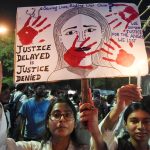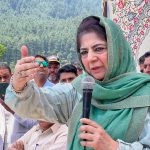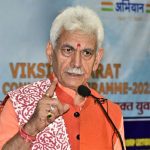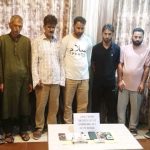Set to elect first govt after a decade
Shortest in two decades with three phases on Sept 18, 25, Oct 1
Voter list to be finalised by Aug 20
Srinagar, Aug 16: Chief Election Commissioner, Rajiv Kumar stated on Friday that the Jammu and Kashmir Assembly polls are scheduled to be conducted “well within the timeframe” and will meet the Supreme Court’s September 30 deadline for completing the democratic process in the union territory.
The Election Commission of India (ECI) has announced that the Assembly elections will be held in three phases: September 18, September 25, and October 1, with results to be declared on October 4.
This will be the shortest election process in the last two decades and the first Assembly election in the region in a decade, following the dissolution of the previous government in June 2018 and the revocation of Article 370 in August 2019.
“The move was intentional so to streamline the process after experiencing lengthy timelines in the Lok Sabha elections, which faced criticism for being overly prolonged,” Chief Election Commissioner Rajiv Kumar said.
Chief Election Commissioner Rajiv Kumar, addressing a press conference in New Delhi, emphasized the elections’ significance in restoring democratic governance, as mandated by the Supreme Court. The final voter list is expected by August 20, after the Amarnath Yatra, with around 87 lakh voters anticipated to participate.
“The people want change, and they want to shape a new future,” said CEC Rajiv Kumar, outlining the Commission’s preparations to ensure a safe and successful election in J&K.
The Union Territory will hold elections for its 90-seat assembly, which comprises 43 seats in the Jammu region and 47 seats in Kashmir. Voting will take place on September 18, 25, and October 1, with the results scheduled to be announced on October 4.
The decision to conduct the elections in three phases is notable, as past elections have been conducted over longer durations due to security concerns. The 2002 elections were held in four phases between September and October, the 2008 elections took place over seven phases in November and December, and the 2014 elections were spread across five phases.
Prime Minister Narendra Modi, during a visit to Srinagar last month, had assured that elections would soon take place, with a promise to restore statehood in the region.
The CEC said that during a recent visit to J&K, the Election Commission observed overwhelming enthusiasm among the people for participating in the electoral process.
He recalled the “long queues” at polling stations during the Lok Sabha elections in J&K and Ladakh, which he viewed as a reflection of the people’s desire for change.
These queues, Kumar said, are “evidence that people want change and to be part of it.” He said that the desire for democracy remains strong, with people choosing “ballots over bullets” to shape their destiny.
CEC said that the ease of voting introduced for Kashmiri migrants during the recent Lok Sabha elections will also be implemented in the upcoming Jammu and Kashmir Assembly polls to continue the special arrangements made for these migrants, as the relaxation measures will remain in place.
The Election Commission had removed the requirement for Kashmiri migrants from Jammu and Udhampur districts to fill out “Form M” to vote, revising the voting scheme for displaced persons during Lok Sabha elections. These voters are now mapped to special polling stations based on their current location, easing the process further.
Election Commission had also facilitated the voting process for Kashmiri migrants residing in Delhi and other parts of the country by permitting self-attestation in place of previous requirements for certification by gazetted officers.
Earlier this month, an EC team led by Rajiv Kumar visited J&K for two days, during which they met political party representatives as well as senior police and security officials.
Before the announcement of the election dates, a major reshuffle took place in J&K’s police force, including district chiefs and the head of the intelligence unit.
The visit was the third visit by the Election Commission since 2019. Previous visits related to the Lok Sabha elections in 2019 and 2024, when the panel decided against holding simultaneous assembly elections.
In December last year, the Supreme Court directed the Election Commission to conduct assembly elections by September 30. The court had been reviewing petitions challenging the revocation of Article 370 and the bifurcation of J&K into the union territories of J&K and Ladakh.
While upholding the revocation of Article 370, the court urged steps to establish a democratically elected government in J&K and restore statehood as soon as possible.
In May 2022, a three-member delimitation commission redefined the electoral boundaries of J&K, allocating 43 seats to the Hindu-majority Jammu region and 47 to the Muslim-majority Kashmir region. Out of the seven new seats, six went to Jammu and one to Kashmir. Regional political parties opposed the delimitation, accusing it of favouring the BJP’s vote base.
J&K has been without an elected government since June 2018, when the BJP withdrew its support for the coalition government led by the Peoples Democratic Party (PDP). The region was placed under governor’s rule before the central government revoked Article 370 in August 2019.
Jammu and Kashmir has not had an elected legislative assembly for five years, with the last elections held in 2014.
FIRST PHASE (18TH SEPTEMBER)
PULWAMA
ANANTNAG
SHOPIAN
KULGAM
RAMBAN
KISHTWAR
DODA
========================
SECOND PHASE (25TH SEPTEMBER)
GANDERBAL
SRINAGAR
BUDGAM
POONCH
REASI
RAJOURI
=======================
THIRD PHASE (1ST OCTOBER)
BANDIPORA
KUPWARA
BARAMULLA
UDHAMPUR
JAMMU
SAMBA
KATHUA










